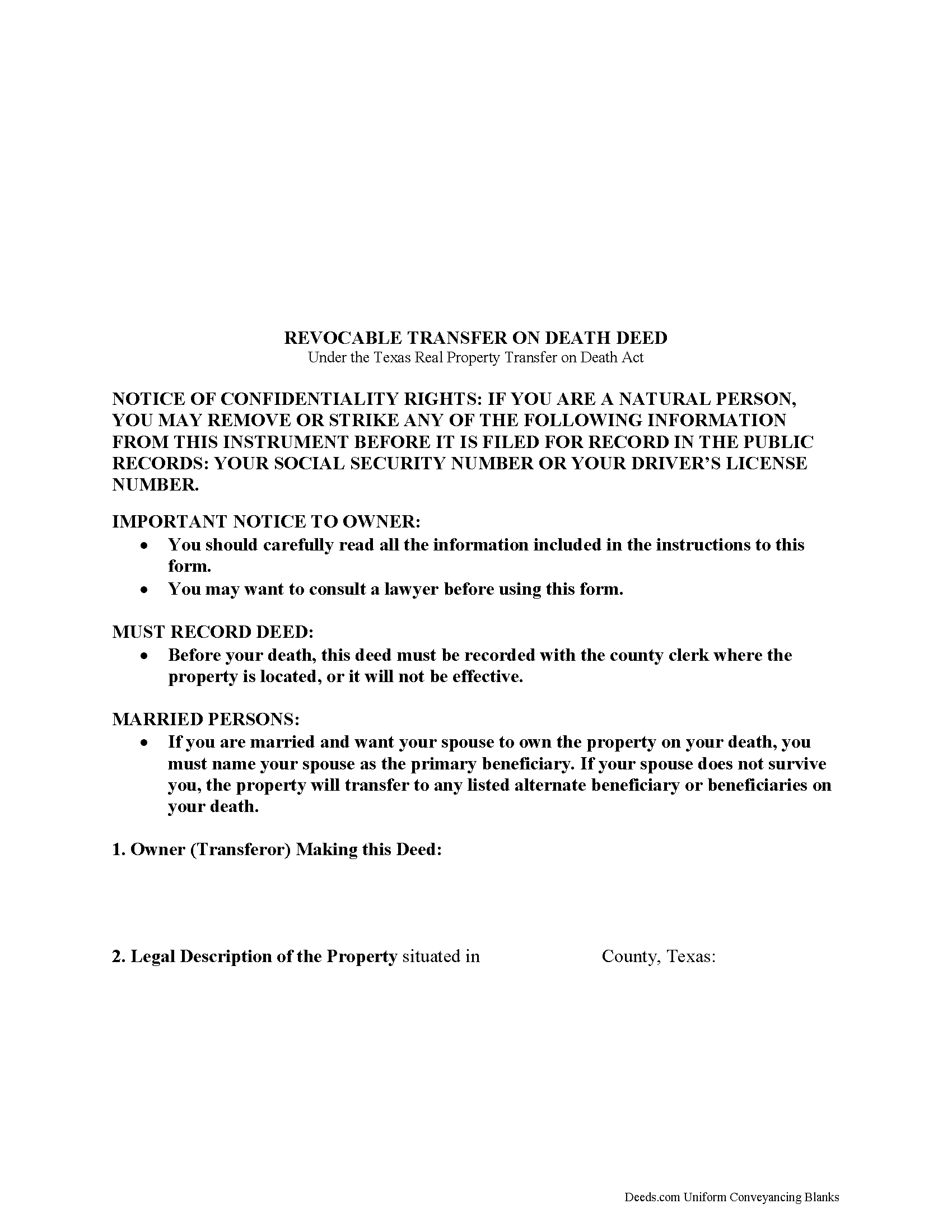Download Texas Transfer on Death Deed Legal Forms

Texas Transfer on Death Deed Overview

On September 1, 2015, owners of real property in Texas gained access to a useful estate planning tool: the statutory transfer on death deed (TODD). Modeled after the Uniform Real Property Transfer on Death Act and located at Chapter 14 of the Texas Estates Code, the Texas Real Property Transfer on Death Act governs the use of transfer on death deeds in the State of Texas.
IMPORTANT: TRANSFER ON DEATH DEEDS AND ASSOCIATED REVOCATIONS MUST BE RECORDED WHILE THE OWNER IS ALIVE OR THEY HAVE NO EFFECT.
Requiring the same level of competency as needed for a contract ( 114.054), transfer on death deeds are nontestamentary (not using a will) instruments. They allow transferors/owners to retain absolute ownership of and control over their land during their lives -- they may sell, mortgage, rent, or otherwise use the real estate as they desire, with no penalty for waste or obligation to notify the beneficiaries ( 114.101).
To be lawfully executed, a TODD must fulfill three minimum standards, set out in 114.055:
* Meet all state and local standards for recordable deeds, including appropriate content and format
* State that the transfer will take place at the owner's death
* Be recorded, during the owner's natural lifetime, in the deed records in the county clerk's office for the county where the property is located.
By recording the executed TODD, property owners may also take advantage of one of the most unique aspects of these instruments: revocability ( 114.052). Revocability is possible for two primary reasons: there is no obligation to notify the beneficiaries about the potential future interest they stand to gain when the owner dies; and these conveyances generally do not involve consideration (something of value given in exchange for the property) ( 114.056).
The statute provides several methods for revoking a TODD. The owner may execute and record a new TODD, cancelling the prior deed and designating a different beneficiary. The owner may also sell the real estate to someone else using a standard inter vivos conveyance such as a warranty deed or a quitclaim deed that contains a comment revoking the TODD. A third option uses a revocation form, which, after recording, cancels all previously recorded TODDs ( 114.057).
Transfer on death deeds convey title with no warranties of title, and subject to all agreements, encumbrances, and other interests in place at the time of the owner's death ( 114.104(a)). Two or more beneficiaries take ownership in equal and undivided shares with no right of survivorship ( 114.103(a)(3)).
In much the same way that owners may wish to change or revoke a beneficiary designation, sometimes beneficiaries are unable or unwilling to accept the property after the owner dies. To address this need, beneficiaries may disclaim all or part of the interest in land ( 114.105).
Under 114.057(b), the recorded TODD is not affected by information contained within the owner's will. Even so, best practices dictate that an efficient estate plan does not contain conflicting directions, so make sure that the documents work together to reinforce the owner's intent.
Overall, TODDs offer a useful, flexible estate planning tool to owners of real property in Texas. Before committing to a TODD, consider the effect it will have on the comprehensive estate plan as well as eligibility for income-and/or-asset-based benefits. Each situation is unique, so for complex circumstances or additional questions, contact a local attorney.
(Texas Transfer of Death Deed Package includes form, guidelines, and completed example)